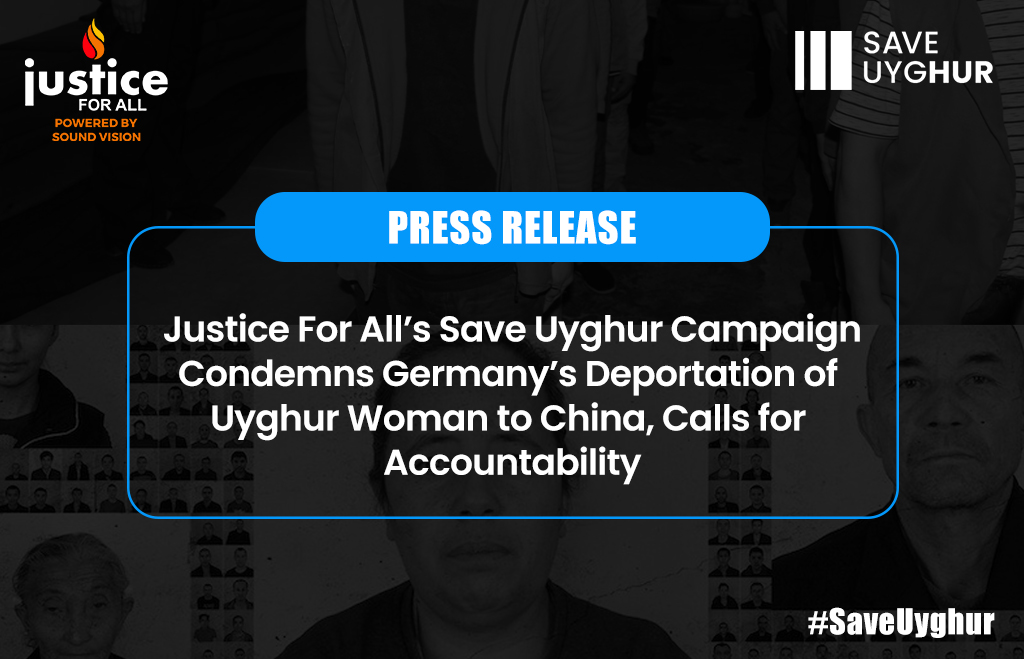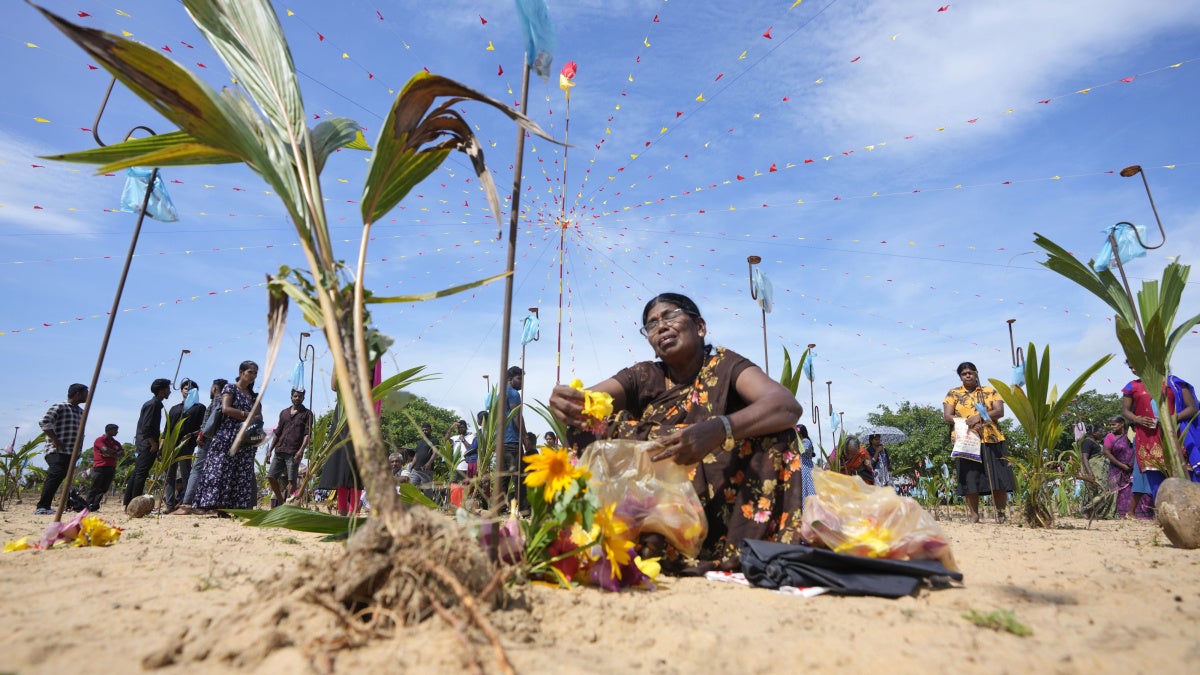Justice For All’s Save Uyghur Campaign Condemns Germany’s Deportation of Uyghur Woman to China, Calls for Accountability – Justice For All

Report on the Deportation of a Uyghur Asylum Seeker from Germany and its Implications for Sustainable Development Goals
1.0 Incident Overview
On November 3, 2025, German authorities deported Ms. Reziwanguli Baikeli (also known as Rizwangul Bekri), a 56-year-old Uyghur woman, to the People’s Republic of China. This action was taken despite a 2018 pledge by Germany to halt such deportations. The subject was escorted by police officers to Beijing. Subsequent reports confirmed that Ms. Baikeli later managed to escape from China and arrive in Türkiye. The incident has been condemned by the human rights organization Justice For All, which has called for an immediate investigation.
2.0 Breach of International Commitments and National Pledges
The deportation represents a significant breach of international and national commitments aimed at protecting vulnerable populations, directly contravening several core principles of human rights and refugee law.
- Violation of Non-Refoulement: The action violates the principle of non-refoulement under international refugee law, which forbids returning asylum seekers to a country where they face a credible threat of persecution or torture.
- Contradiction of National Policy: The event contravenes Germany’s 2018 commitment to cease the deportation of Uyghurs to China, a policy instituted following a similar case where a deported individual was never heard from again.
3.0 Analysis in the Context of Sustainable Development Goals (SDGs)
This case highlights critical failures in upholding the 2030 Agenda for Sustainable Development, particularly in relation to goals concerning justice, equality, and institutional integrity.
3.1 SDG 16: Peace, Justice and Strong Institutions
The deportation directly undermines the objectives of SDG 16, which calls for promoting just, peaceful, and inclusive societies.
- Target 16.3 (Promote the rule of law and ensure equal access to justice): The failure to protect Ms. Baikeli from refoulement demonstrates a lapse in the application of the rule of law and a denial of access to justice for a vulnerable asylum seeker.
- Target 16.6 (Develop effective, accountable and transparent institutions): The incident exposes a critical failure within Germany’s asylum and immigration institutions, raising questions about their effectiveness and accountability in protecting human rights. The lack of transparency surrounding the approval of this deportation is a direct challenge to this target.
3.2 SDG 10: Reduced Inequalities
The action against a member of the persecuted Uyghur minority is a setback for SDG 10, which aims to reduce inequality within and among countries.
- Target 10.3 (Ensure equal opportunity and reduce inequalities of outcome): Deporting an individual to a state where her ethnic group faces systematic persecution represents a profound inequality of outcome within the asylum system.
- Target 10.7 (Facilitate orderly, safe, and responsible migration): This case exemplifies an unsafe and irresponsible migration procedure that puts an individual’s life at risk, contrary to the principles of this target.
3.3 SDG 5: Gender Equality
As the subject of the deportation is a woman, this case also touches upon the goals of SDG 5, which includes the elimination of all forms of violence and discrimination against women.
- Target 5.2 (Eliminate all forms of violence against all women): Forcibly returning a woman to a country where she faces a high risk of persecution and gender-based violence is inconsistent with the global commitment to protect women from harm.
4.0 Recommendations for Upholding SDG Commitments
In response to this institutional failure, and to realign with the principles of the Sustainable Development Goals, the following actions have been urged by human rights advocates:
- German Federal Government: Conduct a full and transparent investigation into the procedural failures that led to the deportation. This is essential for rebuilding institutional accountability in line with SDG 16.
- European Union: Initiate a comprehensive review of member states’ adherence to the principle of non-refoulement to ensure that policies are in place to prevent such incidents, thereby supporting SDG 10 by guaranteeing protections for all migrant groups.
- United Nations High Commissioner for Refugees (UNHCR): Strengthen international protection mechanisms for Uyghur asylum seekers globally, fostering the partnerships (SDG 17) necessary to ensure that nations uphold their commitments to justice and human rights.
Sustainable Development Goals (SDGs) Addressed
- SDG 16: Peace, Justice and Strong Institutions: The article directly addresses this goal by focusing on a failure of justice and institutional accountability. It highlights the violation of international law, the malfunctioning of Germany’s asylum system, and calls for transparent, accountable institutions to protect human rights.
- SDG 10: Reduced Inequalities: This goal is relevant as the article discusses the rights and protection of a specific vulnerable group—Uyghur asylum seekers. The deportation highlights inequalities in the application of protection and justice for refugees and migrants, particularly those fleeing persecution.
Specific SDG Targets Identified
SDG 16: Peace, Justice and Strong Institutions
- Target 16.3: Promote the rule of law at the national and international levels and ensure equal access to justice for all. The article points to a “grave violation of international human rights protections” and a breach of “international refugee law, which prohibits sending individuals back to a country where they face the threat of persecution or torture.” The call for an investigation is a demand for upholding the rule of law.
- Target 16.6: Develop effective, accountable and transparent institutions at all levels. The incident is described as a “critical failure of Germany’s asylum system” and a case where a refugee fell “through the cracks of bureaucracy.” The demand for the German government “to immediately disclose how this deportation was approved and identify those responsible” is a direct call for institutional accountability and transparency.
SDG 10: Reduced Inequalities
- Target 10.7: Facilitate orderly, safe, regular and responsible migration and mobility of people, including through the implementation of planned and well-managed migration policies. The deportation of an asylum seeker to a country where she faces persecution is a clear failure to provide safe mobility. The article criticizes the asylum system’s inability to protect her, indicating a breakdown in well-managed migration and refugee protection policies.
Indicators for Measuring Progress
Implied Indicators for SDG 16
- Number of verified cases of refoulement in violation of international law: The article provides a specific instance of a wrongful deportation (Reziwanguli Baikeli) and references a previous case from 2018. Tracking such cases would be a direct indicator of adherence to international law.
- Proportion of human rights violations by state institutions that are investigated and for which accountability is established: The article’s primary demand is for “an immediate investigation” and for German authorities “to publicly explain how this deportation occurred and to take immediate steps to ensure it never happens again.” This implies a need to measure the responsiveness and accountability of state institutions.
Implied Indicators for SDG 10
- Number of refugees and asylum seekers protected versus forcibly returned, disaggregated by country of origin: The article focuses on the specific vulnerability of Uyghurs. An indicator measuring the rate of protection for this group versus their forced return to China would measure progress towards ensuring safe migration policies for all, especially the most vulnerable.
Summary Table of SDGs, Targets, and Indicators
| SDGs | Targets | Indicators (Implied from Article) |
|---|---|---|
| SDG 16: Peace, Justice and Strong Institutions |
16.3: Promote the rule of law and ensure equal access to justice.
16.6: Develop effective, accountable and transparent institutions. |
– Number of verified cases of refoulement in violation of international law.
– Number of government investigations into failures of the asylum system and actions taken to ensure accountability. |
| SDG 10: Reduced Inequalities | 10.7: Facilitate orderly, safe, and responsible migration and mobility of people. | – Rate of protection granted to asylum seekers from specific vulnerable groups (e.g., Uyghurs) compared to the rate of their forced return. |
Source: justiceforall.org
What is Your Reaction?
 Like
0
Like
0
 Dislike
0
Dislike
0
 Love
0
Love
0
 Funny
0
Funny
0
 Angry
0
Angry
0
 Sad
0
Sad
0
 Wow
0
Wow
0














































































